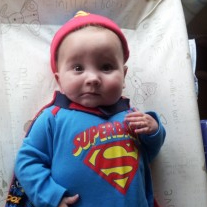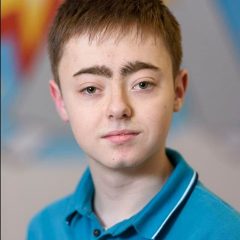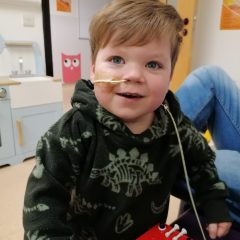 Lucy was Karen and John’s first baby
Lucy was Karen and John’s first baby
Karen and her husband John were looking forward to the arrival of their first child, due in July 1998. Karen had only had a scan at 20 weeks. During the scan she wasn’t able to see the screen for a glimpse of her little one. So, she was extremely excited to get to Bellshill Maternity Hospital to meet and welcome their longed-for child. At midday, she gave birth to a beautiful baby girl, weighing 7.7lbs. “We were on top of the world, although the labour was hard, as Lucy was a back-to-back birth”, Karen remembers.
“Lucy was an angel, sleeping most of the time”. While feeding Lucy that night, Karen noticed that her lips were a little blue. She wasn’t overly interested in taking her bottle. Karen voiced her concerns about the colour change in Lucy’s lips to staff on the ward. “They decided to take Lucy down to special care, though they still gave her an Apgar score of 9, to keep an eye on her”.
Where was Lucy?
The next morning, despite struggling to walk easily after her difficult labour, Karen of course wanted to see her baby. She made her way to the Special Care Unit. However, when she got there, Lucy was nowhere to be seen. When she asked the midwife where Lucy was, Karen was told that she had been transferred to the Intensive Care Unit during the night. Karen immediately phoned John, who came straight to the hospital to find out what was happening.
“For the next 24 hours we were told that no one knew what was wrong – just that Lucy didn’t like being handled and needed a blood transfusion. This was devastating news for all of us, but we believed the staff could make her better”.
The next morning, the doctor came to tell the couple that after seeing a scan, he believed Lucy needed to be ventilated and transferred to the Queen Mother’s Hospital, as her heart didn’t seem right. “Things escalated quickly – the Queen Mum’s staff came to transfer Lucy themselves, as she was gravely ill, along with a police escort”.
Karen and John were then told that Lucy had interruption of the aorta and no parathyroid gland, and she was facing a 30% chance of survival. “Our world crashed down at that moment. This wasn’t the way it was supposed to be. All the hopes and dreams we had were being taken away, and we couldn’t do anything”.
At the Queen Mother’s Hospital, Glasgow
The staff in the ICU quickly helped make the couple feel welcome. Karen and John slept in a room along the corridor for the first few days before being offered a room at Ronald McDonald House Glasgow. “We had no knowledge of the House before we arrived. This was a godsend, as it gave us somewhere to escape for a few hours when we needed – plus it was quiet, unlike the room we were previously sleeping in”.
“The staff were very accommodating and sympathetic to our situation on arrival”, remembers Karen. “The facilities had everything [we] needed, and because the guests living there were all going through struggles, you didn’t need to put a face on to pretend everything was okay – everyone understood. Getting a decent sleep and a breakfast helped us face each day. Lucy struggled every day – several times we believed she wouldn’t see the next day.”
 Lucy stabalises
Lucy stabalises
Despite this, staff managed to stabilise Lucy, and at just 16 days old, she underwent open heart surgery.
“The operation was a terrifying time, and I still feel sick when I think back to that day”, Karen told us. The procedure was deemed a success but couple were warned that Lucy still had a huge fight on her hands.
Although they knew this fight lay ahead, the next morning Karen and John felt filled with hope as they made their way to the ward, relived that the operation was over. But as they entered the Intensive Care Unit, staff took them into a room to deliver the devastating news that they didn’t believe Lucy was going to survive.
Unbelievable news
“I sat there in stony silence while John sobbed uncontrollably, not quite comprehending what they were telling us. Our baby girl wasn’t coming home”.
Karen and John contacted their families and stayed close to the ward. Karen remembers how the nurses went above and beyond while Lucy was in their care. At around 4.15 that afternoon, one of the nurses came to tell them to come quickly as they were fighting to keep Lucy alive. “She was hooked up to so many machines – which I knew – but now she looked tired. She had been fighting to survive since the minute she was born, and now her heart couldn’t take any more. We were beyond heartbroken, but appreciated we were able to spend those hours with her and family were able to say their goodbyes”.
“Lucy passed away peacefully in my arms at 9.25pm, aged 18 days. That night, we returned home numb and broken. Family members offered to go back the next day to collect our belongings and explain to the Ronald McDonald House [Glasgow] staff what had happened. They were so sad to hear our baby had passed away, and offered their support if we needed it. To this day, we will always be grateful to the staff for being there and giving us a place to stay and feel normal in a world we didn’t want to be part of”.
 Piecing together their lives
Piecing together their lives
The couple later discovered that Lucy had been born with chromosome 22q deletion, a genetic condition called DiGeorge syndrome. The interruption of the aorta, hole in the heart, absence of parathyroid gland Lucy experienced were all part of the condition. Karen and John both then went on to be tested, and thankfully were fine and are now parents to two healthy children – Lauren (aged 21) and Stuart (18). “They are our whole world. They both know everything there is to know about their big sister, and love her so much.”
“Life will never be the way it should be. I will always be mum to three children – one in heaven, and two at home – to anyone who asks.”
Fundraising heroes
Karen and John went on to raise thousands of pounds for the Yorkhill scanner appeal in 1998 to thank hospital staff for all their help. They also donated to the Queen Mother’s Hospital and to Ronald McDonald House Glasgow too. On remembering the funds they raised, Karen finished her story by telling us that “No donation could ever be big enough for the help you gave when we needed it most. Thank you”.
Become your own fundraising hero
Are you inspired by Lucy’s story? Do you want to give other families the priceless gift of time together? If so you can simply head to our Donate page and set up a monthly donation. Your regular contribution will help Ronald McDonald House Glasgow secure help for future families in need. Thank you.
Back to Stories


